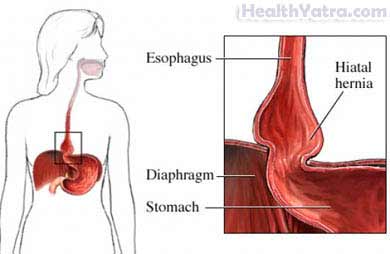Definition
A hiatal hernia is a movement of part of the stomach up into the chest cavity. The stomach presses up through a small hole in the diaphragm muscle. The diaphragm is the muscular wall that separates the abdominal cavity from the chest cavity.
Different types of hiatal hernias include:
- Sliding hiatal hernia—part of the stomach slides into and out of the chest cavity. This is the most common type.
- Fixed hiatal hernia—upper part of the stomach remains in the chest cavity.
- Complicated hiatal hernia—Several other types of stomach herniation may be seen. These are uncommon but more serious and may require surgery.

Causes
The exact cause of hiatal hernias is not clear. Some people are born with a hiatal hernia but most will develop it later in life.
The diaphragm has an opening that the esophagus can pass through. A weakening or injury to this opening can allow a hiatal hernia to develop. Increased pressure in the abdomen can also push the stomach up into the chest cavity.
Risk Factors
Hiatal hernias are more common in adults over 50 years of age.
Other factors that increase your chance of getting hiatal hernia include:
- Obesity
- Abdominal injury
- Regular increased pressure in the abdomen from activities like:
- Severe coughing
- Vomiting
- Straining
- Sudden physical exertion such as weight lifting
Symptoms
Most people with hiatal hernias have no symptoms.
A hiatal hernia can make stomach acid moves up into the esophagus. This is known as gastroesophageal reflux disease (GERD). Symptoms of GERD can include:
- Heartburn, especially after eating or lying down
- Pain or discomfort in the stomach, chest, or esophagus
- Belching
- Hoarseness
- Frequent clearing of the throat from irritation
- Chest pain
- Difficulty swallowing
Diagnosis
Your doctor will ask about your symptoms and medical history. A physical exam will be done. Because they often have no symptoms, hiatal hernias are sometimes only detected during a visit to the doctor for other reasons.
Your doctor may recommend imaging tests to investigate your symptoms. Pictures of the stomach are taken with an upper GI series or endoscopy.
Treatment
Talk with your doctor about the best treatment plan for you. Hiatal hernias are usually treated only when there are symptoms. When GERD is present, treatment may include one or more of the following:
Weight Loss
For people who are obese, losing weight may relieve symptoms.
Dietary Changes
Avoid foods that can relax the muscle that controls the opening between the esophagus and the stomach, including:
- Chocolate
- Peppermint
- Fatty foods
- Coffee
- Alcoholic beverages
Avoid foods and beverages that can irritate the internal lining of the esophagus, such as:
- Caffeine
- Citrus fruits and juices
- Tomato products
- Hot peppers
- Carbonated beverages
To minimize acid reflux:
- Consume smaller meals 4-6 times a day versus three large meals.
- Do not eat within 2-3 hours of bedtime.
Smoking Cessation
If you smoke, quit. Smoking weakens the lower esophageal sphincter, a muscle that controls the opening between the esophagus and the stomach.
Reduce Pressure on Your Abdomen
- Wear clothes and belts that are loose around your waist.
- Avoid stooping or bending after meals, which puts increased pressure on the abdomen.
Elevation
Elevating the head of the bed on 6-inch blocks or sleeping on a specially designed wedge reduces heartburn. This position helps prevent stomach contents from refluxing backward into the esophagus.
Antacids
Your doctor may recommend over-the-counter antacids. These can neutralize acid and temporarily relieve heartburn.
Prescription Medications
For chronic reflux and heartburn, several types of medications may be prescribed to reduce acid in the stomach. These include H2 blocker and proton pump inhibitors.
Surgery
Surgery may be needed if:
- You have severe GERD symptoms that do not respond to other treatments.
- The hernia is at risk for twisting and cutting off the blood supply to your stomach. This is an emergency and requires immediate surgery.
Prevention
There is no known way to prevent hernias.
